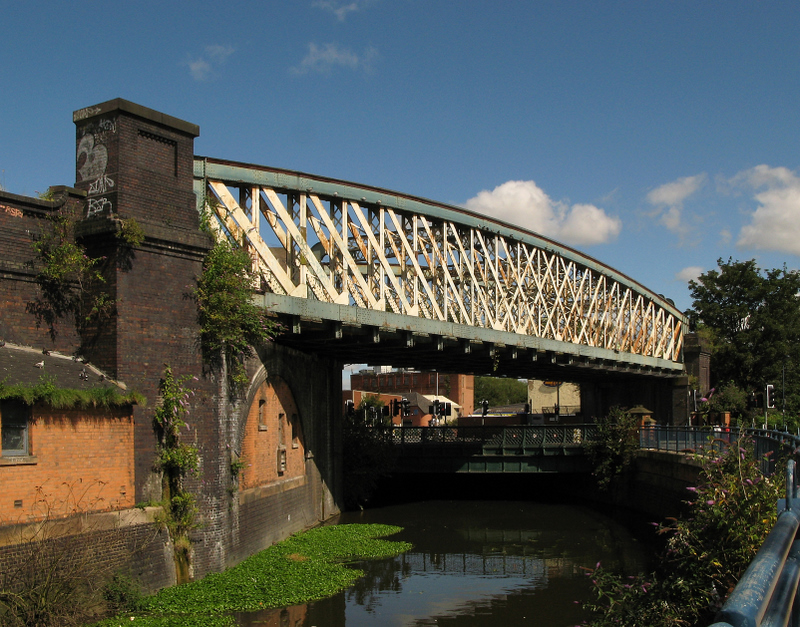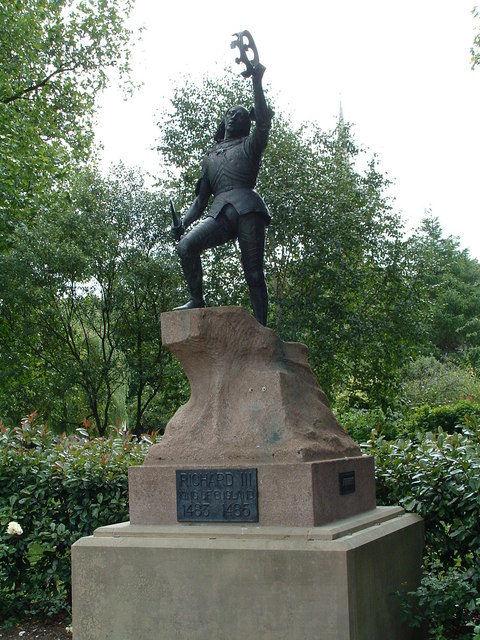 |
| Greyfriars Dicky |
If, as seems likely, an announcement is made shortly confirming that the body of King Richard III has been dug up in a Leicester car park, all sorts of fun will ensue. Nothing much of note ever happens in Leicester - a state of affairs reflected in its motto - so this kingly kerfuffle is rather exciting.
 |
| Leicester is actually off Junction 21, but that's splitting hairs* |
The biggest storm brewing seems to be about where the rediscovered Richard should be officially buried. Ignoring the possibility that he already was, a government announcement has stated that the long-lost king will be interred in Leicester Cathedral. This has riled a few Yorkist folk, who demand that their one-time leader should instead be buried in the place he wished to be: York Minster.
As a resident of York and the son of a Yorkshirewoman, I have no inherent issue with this. It is a logical demand. However, I am a Leicestrian born and bred and I very much side with my home town in this case, for reasons I will endeavour to explain.
*As opposed to the DNA research into King Richard's descendants, which is splitting heirs.
Why Leicester needs Richard and York doesn't
There are two types of history: hidden and visible. The latter is there on a plate; the former is not.
Leicester's heritage is very much of the hidden variety. It is an ancient town, but most of its historic buildings have been obliterated or buried by the perpetually myopic decisions of Philistinic local leaders. Over and over and over again, fine old structures get knocked down in the name of progress.
 |
| Leicester Castle. What do you mean you're not impressed? |
York, meanwhile, is a lovely old city full of diverting attractions, from Cliff Richard's Tower to the Shrivelled Hand of Margaret Clitherow, and its abundantly presentable history means visitors flock here every year in their millions.
.jpg) |
| An aerial view of York, with a Minster in the middle. |
Vaguely attentive tourists will note that York isn't scar-free. Piccadilly and the Stonebow stand out as 20th Century aberrations. The import thing is that they stand out, though. They are anomalous. Furthermore, when a shopping centre is built, the amazing discoveries get incorporated.
In contrast, central Leicester is now almost nothing but Stonebows and Piccadillies. Monolithic dullness is everywhere; character barely gets a look in. And when new shopping centres spring up, the amazing discoveries made are secreted away into a store cupboard, or simply reburied.
 |
| Leicester's Highcross area in the early 19th Century. Now look at it. |
For a fair slice of the 20th Century, thanks to its hosiery, engineering, and boot and shoe industries, Leicester was one of the wealthiest cities in Britain*. York, in contrast, suffered from high levels of poverty.
Consequently, Leicester's authorities would have had a lot more income to play with than York's. In his fascinatingly depressing book, Britain's Lost Cities, Gavin Stamp explores the post-war destruction of historic town centres, and shows that, whilst many UK cities wanted to destroy old buildings on an epic scale, the degree of demolition was often linked to the city's finances. I wonder if this is partly why York's old town survives, whilst Leicester has little left of historic value.
 |
| This is of no historic value: knock it down. |
So if you compare the magnificence of the Minster with the magnificence of Leicester Cathedral, or set the importance of Eboracum against the importance of Ratae Corieltauvorum, it's no contest. York wins hands-down. But that's to see the visible, and completely miss the hidden. York doesn't need the body of a long-dead king to get people to explore its history. Leicester absolutely does.
*The Wikipedia claim is not backed up by a reference, but my dear mother tells me that when she moved there from Yorkshire in the 1950s, Leicester was known as the third wealthiest city in Europe.
Royal Leicester
Leicester Castle may be nothing to look at now, but it was once a seat of the Plantagenets, and its most important custodian was John of Gaunt. He spent much of his time at the castle, having become Earl of Leicester and the 1st Duke of Lancaster by marriage, and died there in 1399.
Using a Lancastrian lord to make a claim on a Yorkist king might seem tenuous, but not only was John of Gaunt a Plantagenet, he was also Richard's great-grandfather. And anyway, mediaeval York was hardly loyally Yorkist: during the Wars of the Roses, most Yorkshiremen were Lancastrians!
 |
| John of Gaunt, 1st Duke of Lancaster (1340-1399): the 16th wealthiest person ever to have lived, allegedly. |
Post-John and pre-Richard, Leicester remained royally important. In 1426, the infant King Henry VI was knighted in the church of St Mary de Castro, during the wonderfully named Parliament of Bats. A dozen years earlier, during the reign of Henry V, the equally exciting-sounding Parliament of Fire and Faggot had been held at the Greyfriars Priory. When Richard was laid to rest there in 1485, it was an important location in an important city.
Richard in Leicester
Allegedly, Leicester Castle was of 'no interest' to Richard or the Yorkists, which is why he stayed the night before the Battle of Bosworth in a Travelodge. It is stated elsewhere, though, that he had visited Leicester many times, and stayed in the castle 'often'. The city has celebrated these connections in various ways. There is a magnificent pub, a glorious boulevard, and a (presumably tower-free) school, none of which feature in the Leicester City Council walking tour.
I'm being slightly facetious, but don't miss my real meaning. The histories of Leicester and Richard are inextricably tied to one another, it's just that people never seem to appreciate it. The 'Have I Got News For You' joke above inadvertently makes this point. A king who isn't loved, who is in need of a second look from history, appears to have been found in a city that needs exactly the same treatment. Hidden for centuries and little-admired, Richard and Leicester are perfect for one another.
 |
| Statue of Richard III, Castle Gardens, Leicester. |
But shall we wear these glories for a day?
Or shall they last, and we rejoice in them?
If it is true (and the increasing fanfare of publicity hardly suggests otherwise), the royal re-discovery provides a unique chance to do a wonderful thing: to right the wrongs of the generations of obliterative buffoons, and help make the hidden history of an ancient English town visible again. The mayor of Leicester has already started a campaign of this kind.
Keeping Richard in Leicester, telling his story and the city's history, would benefit not only the multicultural population of Leicestrians, but anyone interested in a new perspective of mediaeval Britain. Sending Richard back to York would be a missed opportunity.
 |
| Frankly unnecessary. |
If Richard stays in Leicester, though, another missed opportunity would be to simply plonk this Catholic king into an Anglican cathedral and requisition a nearby school into a makeshift exhibition centre. Far more fitting would be to reconstruct the place where Richard slept his last night. The layout of the Blue Boar Inn is known in exact detail, and rebuilding it using as many original techniques as possible would be a wonderful project.
Perhaps then, Greyfriars Dicky could finally rest in peace.
 |
| Memorial plaque to Richard III, Bosworth Field. |
--------------
Of course, it could be that the body isn't Richard's at all and we're all getting terribly excited about an unfortunate and unknown Grey Friar. If that is the case, here's some Supergrass to enjoy instead:
Comments